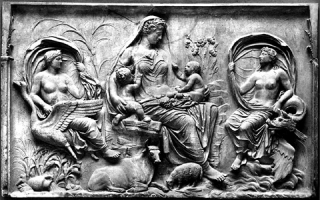






Why
should I beget children for national victories?
There will be no soldier of my blood!
You alone give me joy, Cynthia
let me alone please you.
Our love will mean far more than fatherhood
Propertious
Elegy 2.7
If we could survive without a wife, citizens of Rome, all of us would do without that nuisance; but since nature has so decreed that we cannot manage comfortably with them, nor live in any way without them...we must plan for our lasting preservation rather than for our temporary pleasure.
Augustus in the senate according to Livy
Reproduction, being a biological imperative, it is something people take for granted; yet, without the renewal of birth, populations shrink and progress fades into dim archaeological reminiscences. While not so melodramatic, ancient Rome suffered what could be regarded as a similar, although far lesser, birth crisis during the Principate. Birth levels among high classes were at an all time low, apparently due to many couples (possibly in conjunction with adultery) simply choosing to avoid reproduction. The result involved a new set of litigation to encourage procreation. In 18 B.C., emperor Augustus assessed heavier taxes on bachelors and unmarried women, and by contrast offered incentives for marriage and fecundity which became known as lex Julia et Papia. In order to further encourage childbearing, and to attempt to curb the infidelity and decadence seemingly rampant in Rome, provisions were made to establish adultery as a criminal activity. Now punishable by loss of property or exile, adultery carried the harsh consequences of the adultery laws.
Two specific examples of how these laws bared upon women are as follows; fathers were permitted to kill daughters and their partners in adultery. Husbands could kill the partners under certain circumstances and were required to divorce adulterous wives.
Augustus preached these ideals and invoked these laws as part of his new genius image…focusing on Rome and the family. Ironically, this legislation was invoked on his own daughter, Julia, a renowned slut, who was eventually exiled to the island of Pandateria on charges of adultery.
Propertius' concern may me with an early version of Augustinian marriage laws that may have separated his beloved from him, perhaps forcing him to marry a 'respectable' bride, but the poem suggests that the law was withdrawn or abrogated and the lovers thus were saved.
To further motivate the aristocracy, anyone who wished (barring senators) were now able to marry freedwomen, and the children of such marriages were now legitimate.
Even in marriage, sexual contact between man and wife might not be often due to the widespread use of prostitutes and courtesians. Since people were still having sex(perhaps moreso), why still were there not unwanted pregnancies and births? The answer is contraception. The prostitute was well versed in the art, and through her patrons, its knowledge reached the bedrooms of women throughout Rome.
The new legislation was not merely anti-birth control and adultery; it actually encouraged marriage and the fruitful production of legitimate heirs through tax incentives and new political leverage to fecund women.
The aim of this project is to look into the most basic cause of such legislation to be deemed necessary- that of birth control, and to investigate its intent- to increase legitimate childbirth among the upper crust. Contraception and means to avoid bearing offspring are outlined, as well as ancient views of women's anatomy, ideas behind fertility, pregnancy, and childbirth itself……..age-old ideas on, and solutions to age-old problems.